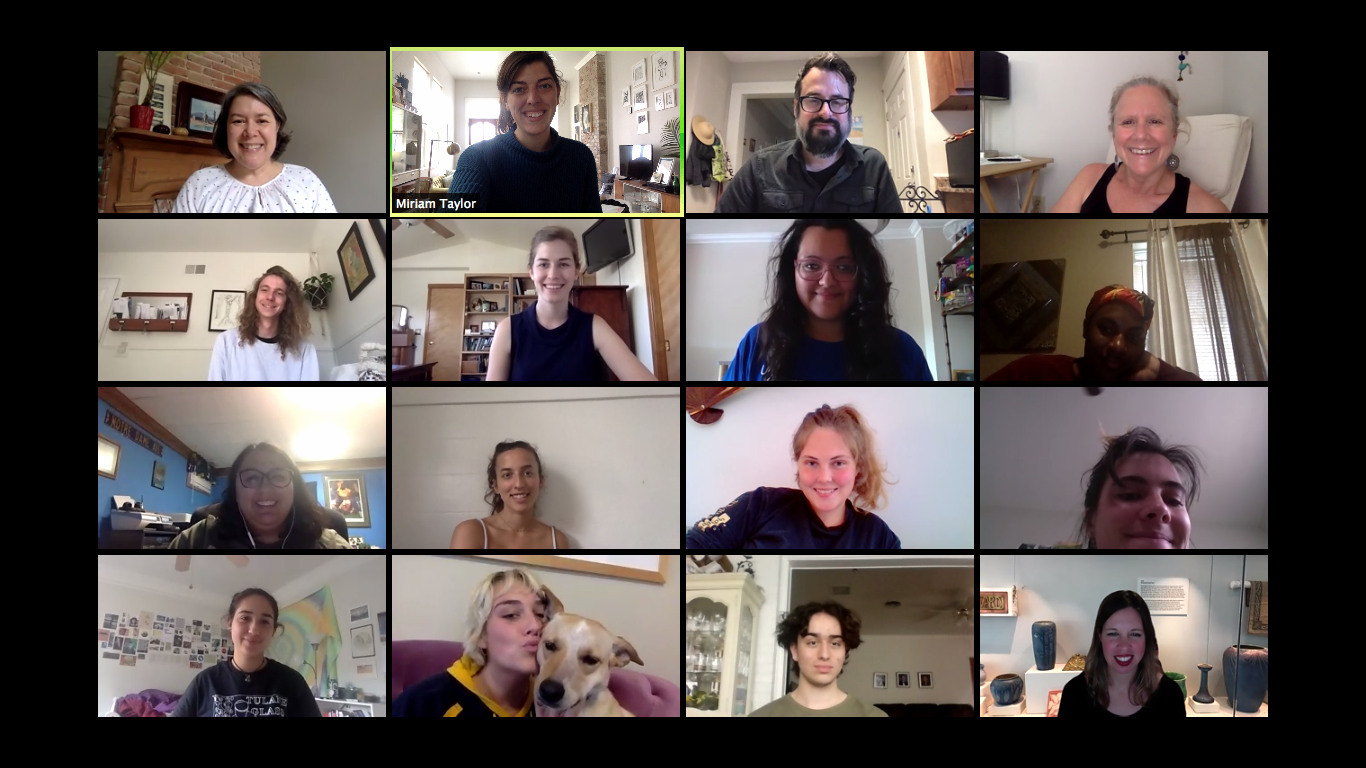
“In this time of social distance, let’s appreciate the power of community and mutual aid.”
- Hormigas study group
An introduction to the exhibition
// Zoom classroom, Tulane University. April 2, 2020.
// Header image Hierve el Agua, Oaxaca, México by Abraham De La Cruz
This online exhibition, Conexión: Art and Activism in Oaxaca, was envisioned and curated by Tulane students taking the Spring 2020 course “Women, Community and the Arts in Latin America: Oaxaca, Mexico”. Co-taught by Edith Wolfe, Assistant Director of the Stone Center for Latin American Studies, and museum Director Monica Ramirez-Montagut, the class asked how Oaxacan socially-engaged artists and activists address the problems of gender-based violence and discrimination, economic hardship, access to education, family separation and other issues affecting their communities.
The student-curated show Conexión: Art and Activism in Oaxaca documents how community-based projects in San Francisco de Tanivet and central parts of the city are shifting the narratives of human rights and empowerment, female authorship, immigration and childcare in the workplace. Examples cited include the civil society group Oaxaca Consortium for Parliamentary Dialogue and Equity that tracks missing women of the region, among other programs centered on gender equity; El Balcón, a space for children in the region’s largest market that functions as an education space, as a respite from child labor and as living theater; Las Hormigas Bordadoras de Tanivet, a group of women whose embroidered reflections on migration have become a means of economic survival and political resistance; and Guindhá Casa Taller, a community print workshop that creates a physical and social space for female artists.
Conexión: Art and Activism in Oaxaca was organized by thirteen Tulane students: Lenore Alexander, Eric Charles, Lydia Cruz, Grace Donahue, Jasmine Gloria, Caroline Griffis, Marina Hernandez, Zachary Kanzler, Lucia Paternostro, Catherine Prechtel, Claire Skivington, Tamia Toomer, and Gabriella Zimbalist. The project was facilitated by Laura Blereau and Miriam Taylor of Newcomb Art Museum of Tulane University, and has been generously supported by the Dorothy Beckemeyer Skau Art and Music Fund at the Newcomb College Institute, Stone Center for Latin American Studies, The Center for Inter-American Policy & Research, the Gender and Sexuality Studies program, the Dean’s office at the School of Liberal Arts, the Center for Engaged Learning & Teaching, the Center for Public Service, and Center for Academic Equity.
About the Artist and Activists
The Oaxaca Consortium for Parliamentary Dialogue and Equity addresses political gender inequity. The organization was established in 2003 with the aim of influencing legislative processes and public policy, organizing citizen networks to train and educate women on their rights, and building a participatory society for democracy, justice and social inclusion. Through projects such as news publications and informational campaigns, they create tools and environments that promote respect and human rights.
Saúl López Velarde is a performing artist and activist trained in sociology who founded El Balcón in 2011 at the Central de Abastos market in Oaxaca, his hometown. Using a merchant stall, he has intervened to create an place of community in the marketplace for children of working famillies where they can socialize, learn, and create projects together.
Las Hormigas Bordadoras (which translates to “The Embroidery Ants”) is a women’s quilting collective located 25 miles east of Oaxaca in a small village called San Francisco Tanivet. Founded in 2010, the group is comprised of five artists, Juana Martinez Olivera, Rebeca Martinez Santo, Jennifer Grijalva Martinez, Rosalva Gracia Martinez, and Leonina Aragon Grijalva. As a means of economic survival and resistance, they crafts salable fiber works that reflect on migration and farming.
The Guindhá Casa Taller is a studio workshop that strategically provides a space for women printmakers in Oaxaca. With an aim to support the production and distribiution of work, they host exhibitions and lead seminars to train the community on printmaking crafts. Founded in 2017, the shop is run by three women artists, Merecedes López, Soledad Vázquez and Viridiana Carmona, who studied engraving at the Benito Juárez Autonomous University of Oaxaca.

